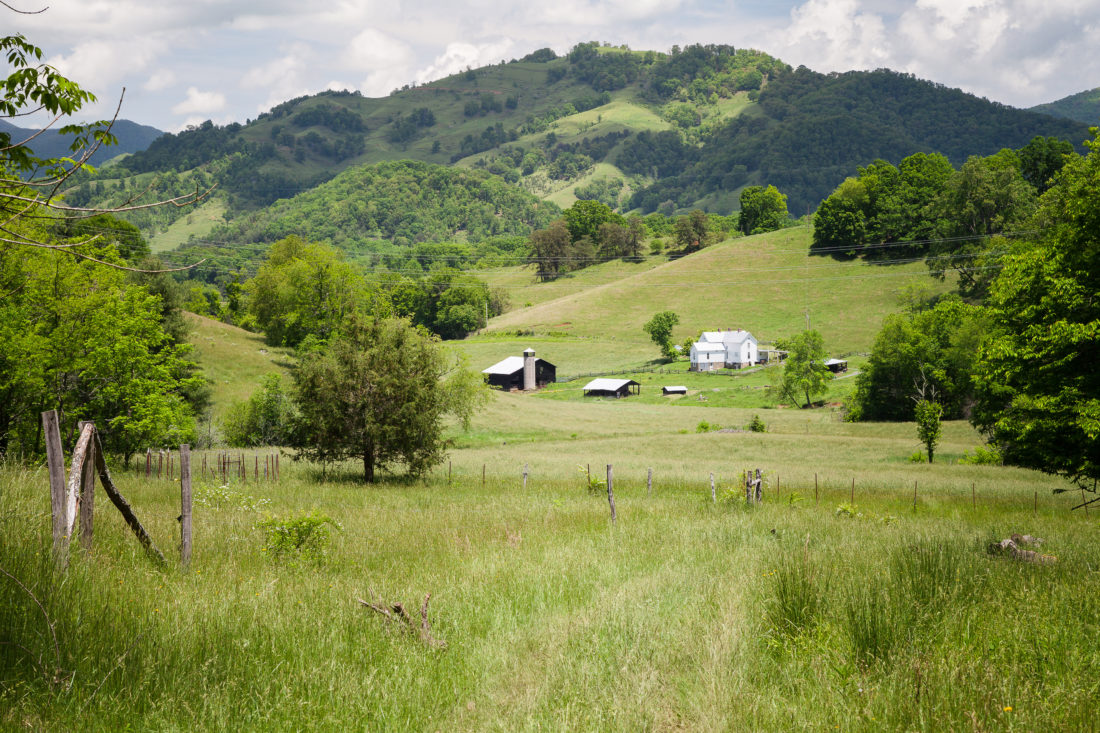Press release from the Southern Appalachian Highlands Conservancy:
Hugged by mountains and tucked away in the scenic Crabtree community of Haywood County, Rogers Cove contains beautiful rolling pastures and forested hills that stir the imagination. The Southern Appalachian Highlands Conservancy (SAHC) has permanently protected 385 acres of productive, scenic farmland in this cove through agricultural conservation easements.
“The Rogers family has farmed this land for at least four generations and wanted to see it stay farmland forever, which is why they protected their land with SAHC through agricultural easements,” says Jess Laggis, SAHC’s Farmland Protection Director. “Beyond all the beauty and ecosystem services this land protection provides, it also supports some of the kindest farmers you could meet in maintaining our mountain farming heritage.”
Highly visible from scenic drives along Crabtree Mountain Rd and Upper Crabtree Road, as well as from hikes on Crabtree Bald, conserved land in this picturesque cove is made up of multiple adjoining tracts owned by members of the Rogers family. The family has farmed this cove for more than 150 years. The Rogers Cove properties include a mixture of high elevation cattle grazing pasture and prime agricultural bottomlands, and both the Mark Rogers and the Terry & Fran Rogers properties have been designated as Century Farms by the state of NC.
“Rogers Cove makes time travel possible,” adds Laggis. “Walking through Rogers Cove feels like a step back in time, but in it, I also see the future. I know that in 10 years, or even 50, when I look back at the farmland protection work SAHC has accomplished, Rogers Cove will always stay a vibrant memory. We are grateful to the Rogers family, the NC Department of Agriculture’s Agricultural Development and Farmland Preservation Trust Fund, The Pigeon River Fund, Brad and Shelli Stanback, and all of SAHC’s members for protecting this historically important, thriving farm.”
Family members Edwin & Lucene (Cenie) Rogers, Mark & Laura Rogers, and Terry & Fran Rogers worked together with SAHC to protect their adjoining properties, which were originally part of a land purchase by family ancestor John H. Rogers almost 200 years ago. Edwin passed away in 2017, before he saw completion of this effort, but the rest of the family was able to continue working with SAHC to permanently protect the land.
Edwin Rogers, who was designated a River Friendly Farmer by the Haywood County Soil & Water Conservation District, farmed in Rogers Cove his whole life. Edwin and his son Mark worked closely together to keep the farm in excellent condition by installing stream-side fencing and water tanks and using rotational grazing practices. Terry Rogers – who has been president of the Haywood County Farm Bureau, Treasurer of the Haywood County Cattlemen’s Association, and president of the WNC Beef Cattle Commission — also installed best management practices on his farm to protect water quality of streams in the Pigeon River watershed.
“I’ve worked this land all my life,” said Terry, “working with both my paternal and maternal grandparents, as well as my own parents. I’ve seen the hard work my ancestors put into being good stewards of the properties, never holding a public job, but depending on the farm and woodland to make a living for their families. Like them, I have tried to be a good steward of what God has blessed me with, and I don’t want this beautiful property turned into a housing development in the future. Now that it’s protected by the Southern Appalachian Highlands Conservancy, that won’t ever happen.”
The Pigeon River Fund, a grant program administered by The Community Foundation of Western North Carolina, provided support for this project.
“One focus of the Pigeon River Watershed Plan is reducing development density on steep mountain slopes,” says Tara Scholtz, Senior Program Officer with The Community Foundation of Western North Carolina (CFWNC).
“Reducing development density means fewer roads, house sites, driveways, and other structures and infrastructure that negatively affect the watershed. Reducing density also reduces the number and size of impervious surfaces in the watershed and the associated stormwater runoff. Farmland conservation is one of the plan’s specific strategies for reducing development density, but transactions to conserve farmland often take time. The Pigeon River Fund was pleased to assist SAHC in protecting hundreds of acres of Rogers Cove agricultural land that would otherwise undoubtedly be a target for future development.”



Before you comment
The comments section is here to provide a platform for civil dialogue on the issues we face together as a local community. Xpress is committed to offering this platform for all voices, but when the tone of the discussion gets nasty or strays off topic, we believe many people choose not to participate. Xpress editors are determined to moderate comments to ensure a constructive interchange is maintained. All comments judged not to be in keeping with the spirit of civil discourse will be removed and repeat violators will be banned. See here for our terms of service. Thank you for being part of this effort to promote respectful discussion.